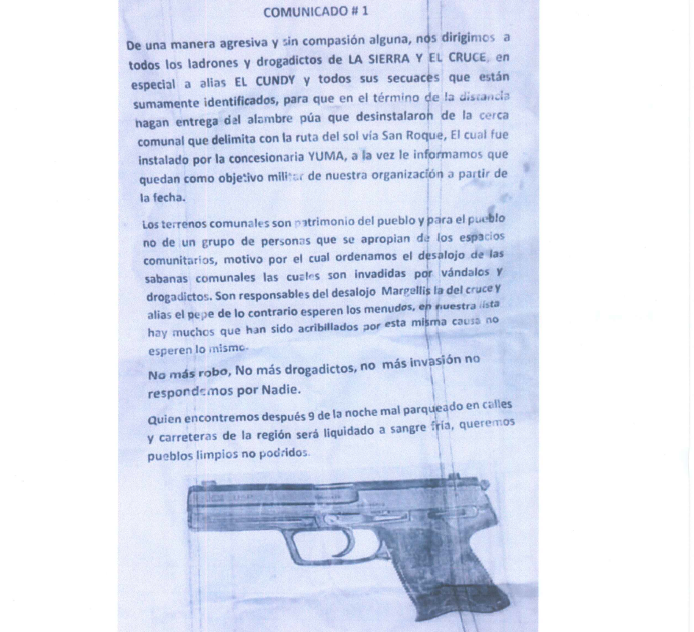After eight human rights defenders were assassinated, and others have received death threats, Colombian activists fear that the health crisis caused by the coronavirus is being exploited by illegal armed groups.
The United Nations and the Organization of American States share this concern.
Colombia entered a national quarantine on Wednesday March 25, but local measures had already been taken in some areas. The eight assassinations all occurred in communities that were under quarantine due to the coronavirus.
Various institutions meant to protect human rights and prevent violence have become less active due to the quarantine. As the number of coronavirus infections in Colombia increases and mobility is more and more restricted, it has become increasingly difficult to rely on mechanisms that were in place to protect social leaders and peace activists. This lack of protection disproportionally affects the most vulnerable sectors of society. In addition, people who are told to stay in their homes are now easy to find for those seeking to harm them.
Joris van de Sandt, programme leader at PAX, says, “The Colombian State and local authorities have the responsibility to guarantee the protection of all social leaders. Illegal armed groups should not be able to act freely and with impunity during the quarantine. We call on President Duque to protect the population, not only from the coronavirus, but also from the weapons that have silenced so many people before.”
Wave of assassinations
There has been a wave of assassinations in the past two weeks. On March 19 three people were assassinated: Marco Rivadeneira, a recognized social activist and political leader in Putumayo; Ivo Humberto Bracamonte, a local progressive politician in Norte de Santander; and Ángel Ovidio Quintero, a local social leader in Antioquia. On March 24, two indigenous leaders and one former guerilla member were killed. In addition, armed groups have forcibly displaced people in Chocó and in Nariño.
Earlier this month, Alexis Vergara, an Afro-Colombian leader and trade unionist in the sugar industry, was assassinated on March 8 in the northern part of Cauca, an area where PAX is active. In the Cesar mining region, Margeyis Valencia Barbosa, a leader and defender of her community’s territorial rights, received a pamphlet containing a death threat on March 16. Unfortunately this is nothing new. Afro-Colombian communities in Cesar have been under threat for years and have repeatedly been the targets of violence. One of them, Néstor Iván Martínez, who opposed the expansion of the mining operations of the multinational Drummond, was assassinated in September 2016. (PAX has been working in Cesar for many years.)
Lack of protection
For some time, Colombia has been one of the most dangerous countries in the world for activists and social leaders. Due to the quarantine and the Colombian government’s focus on fighting the coronavirus, the risks to activists are even greater now.
The National Protection Unit, the agency which provides protection to politicians and public figures, has been scaling back it’s protection measures, including bodyguards, secure cell phones and armored vehicles. Those who have been threatened are told to remain in their residences, but without any protection. The Human Rights Ombudsman’s Office has recently closed its doors throughout the country and the alternatives such as acess to the latest modes of communication are often not accessible to the most vulnerable. Existing preventive and emergency protection mechanisms for human rights defenders have been weakened, making them feel abandoned by the State. They fear ever-increasing violence, and there is widespread mistrust of local authorities.
Protect the people
Van de Sandt: “The corona crisis means that those social leaders who have been attacked in the past because they were defending their rights or criticizing companies and local authorities are now at greater risk. Therefore, we call on all Colombian authorities, as well as companies active in territories in which the armed conflict continues, to reject these threats and do everything in their power to protect these people. ”




